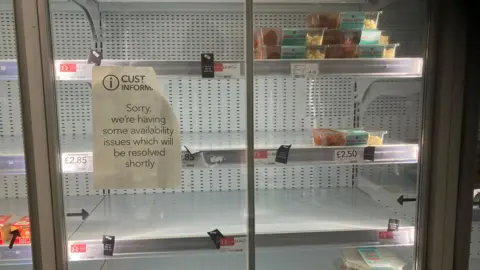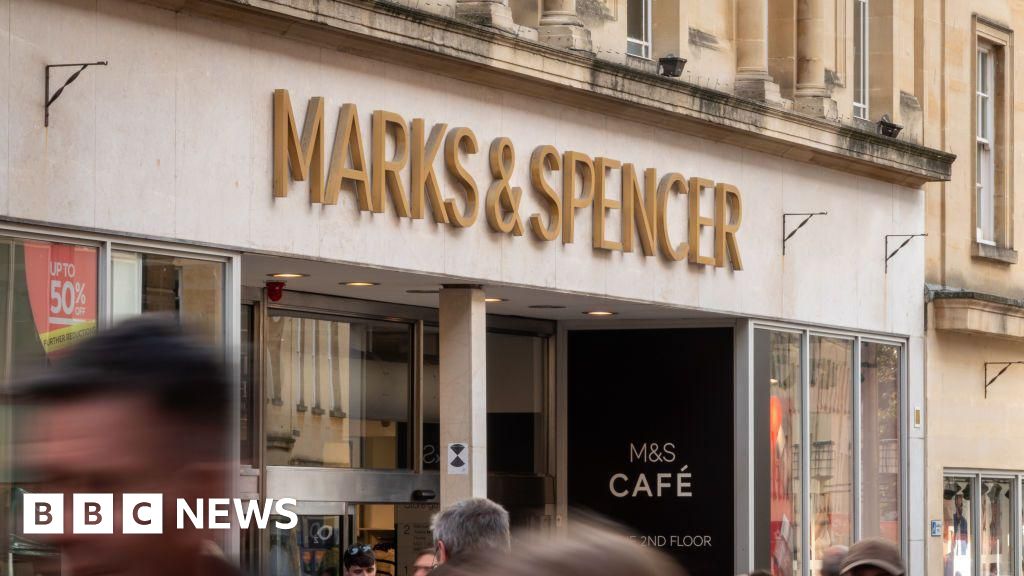ARTICLE AD BOX
Joe Tidy
Cyber correspondent

 BBC
BBC
Joe Tidy interacted with hackers who claimed to have done the M&S and Co-op hack
Almost daily, my phone pings with messages from hackers of all stripes.
The good, the bad, the not-so-sure.
I've been reporting on cyber security for more than a decade, so I know that many of them like to talk about their hacks, findings and escapades.
About 99% of these conversations stay firmly locked in my chat logs and don't lead to news stories. But a recent ping was impossible to ignore.
"Hey. This is Joe Tidy from the BBC reporting on this Co-op news, correct?" the hackers messaged me on Telegram.
"We have some news for you," they teased.
When I cautiously asked what this was, the people behind the Telegram account - which had no name or profile picture - gave me the inside track on what they claimed to have done to M&S and the Co-op, in cyber attacks that caused mass disruption.
Through messages back-and-forth over the next five hours, it became clear to me that these apparent hackers were fluent English speakers and although they claimed be messengers, it was obvious they were closely linked to - if not intimately involved in - the M&S and Co-op hacks.
They shared evidence proving that they had stolen a huge amount of private customer and employee information.
I checked out a sample of the data they had given me - and then securely deleted it.


Shoppers have been met with empty shelves at some UK Co-op stores in recent weeks
Messages that confirmed suspicions
They were clearly frustrated that Co-op wasn't giving in to their ransom demands but wouldn't say how much money in Bitcoin they were demanding of the retailer in exchange for the promise that they wouldn't sell or give away the stolen data.
After a conversation with the BBC's Editorial Policy team, we decided that it was in the public interest to report that they had provided us with evidence proving that they were responsible for the hack.
I quickly contacted the press team at the Co-op for comment, and within minutes the firm, who had initially downplayed the hack, admitted to employees, customers and the stock market about the significant data breach.
Much later, the hackers sent me a long angry and offensive letter about Co-op's response to their hack and subsequent extortion, which revealed that the retailer narrowly dodged a more severe hack by intervening in the chaotic minutes after its computer systems were infiltrated. The letter and conversation with the hackers confirmed what experts in the cyber security world had been saying since this wave of attacks on retailers began – the hackers were from a cyber crime service called DragonForce.
Who are DragonForce, you might be asking? Based on our conversations with the hackers and wider knowledge, we have some clues.
DragonForce offers cyber criminal affiliates various services on their darknet site in exchange for a 20% cut of any ransoms collected. Anyone can sign up and use their malicious software to scramble a victim's data or use their darknet website for their public extortion.
This has become the norm in organised cyber crime; it's known as ransomware-as-a-service.
The most infamous of recent times has been a service called LockBit, but this is all but defunct now partly because it was cracked by the police last year.
Following the dismantling of such groups, a power vacuum has emerged. Cue a tussle for dominance in this underground world, leading to some rival groups innovating their offerings.
Power struggle ensues
DragonForce recently rebranded itself as a cartel offering even more options to hackers including 24/7 customer support, for example.
The group had been advertising its wider offering since at least early 2024 and has been actively targeting organisations since 2023, according to cyber experts like Hannah Baumgaertner, Head of Research at Silobeaker, a cyber risk protection company.
"DragonForce's latest model includes features such as administration and client panels, encryption and ransomware negotiation tools, and more," Ms Baumgaertner said.
As a stark illustration of the power-struggle, DragonForce's darknet website was recently hacked and defaced by a rival gang called RansomHub, before re-emerging about a week ago.
"Behind the scenes of the ransomware ecosystem there seems to be some jostling - that might be for prime 'leader' position or just to disrupt other groups in order to take more of the victim share," said Aiden Sinnott, senior threat researcher from the cyber security company Secureworks.
Who is pulling the strings?
DragonForce's prolific modus operandi is to post about its victims, as it has done 168 times since December 2024 - a London accountancy firm, an Illinois steel maker, an Egyptian investment firm are all included. Yet so far, DragonForce has remained silent about the retail attacks.
Normally radio silence about attacks indicates that a victim organisation has paid the hackers to keep quiet. As neither DragonForce, Co-op nor M&S have commented on this point, we don't know what might be happening behind the scenes.
Establishing who the people are behind DragonForce is tricky, and it's not known where they are located. When I asked their Telegram account about this, I didn't get an answer. Although the hackers didn't tell me explicitly that they were behind the recent hacks on M&S and Harrods, they confirmed a report in Bloomberg that spelt it out.
Of course, they are criminals and could be lying.
Some researchers say DragonForce are based in Malaysia, while others say Russia, where many of these groups are thought to be located. We do know that DragonForce has no specific targets or agenda other than making money.
And if DragonForce is just the service for other criminals to use – who is pulling the strings and choosing to attack UK retailers?
In the early stages of the M&S hack, unknown sources told cyber news site Bleeping Computer that evidence is pointing to a loose collective of cyber criminals known as Scattered Spider - but this has yet to be confirmed by the police.
Scattered Spider is not really a group in the normal sense of the word. It's more of a community which organises across sites like Discord, Telegram and forums – hence the description "scattered" which was given to them by cyber security researchers at CrowdStrike.
They are known to be English-speaking and probably in the UK and the US and young – in some cases teenagers. We know this from researchers and previous arrests. In November the US charged five men and boys in their twenties and teens for alleged Scattered Spider activity. One of them is 22-year-old Scottish man Tyler Buchanan, who has not made a plea, and the rest are US based.
Crackdowns by police seem to have had little effect on the hackers' determination, though. On Thursday, Google's cyber security division issued warnings that it was starting to see Scattered Spider-like attacks on US retailers now too.
As for the hackers I spoke to on Telegram, they declined to answer whether or not they were Scattered Spider. "We won't answer that question" is all they said.
Perhaps in a nod to the immaturity and attention-seeking nature of the hackers, two of them said they wanted to be known as "Raymond Reddington" and "Dembe Zuma" after characters from US crime thriller The Blacklist which involves a wanted criminal helping police take down other criminals on a blacklist.
In a message to me, they boasted: "We're putting UK retailers on the Blacklist."



 3 hours ago
1
3 hours ago
1








 English (US) ·
English (US) ·